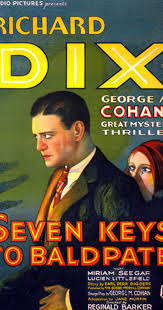
William Halliwell Magee (Richard Dix) and his friend Hal Bentley (Crauford Kent) are having drinks at a New York City club. The subject of their conversation is writing, and wagering. Magee makes a bet with Bentley that he can write a ten thousand word novel within twenty-four hours. Needing solitude Magee says all he needs is what he calls the lonesomest spot on Earth. Bentley says he has just the place. He owns a summer inn that is currently closed for the winter. The hotel is called Baldpate Inn.
Bentley makes fun of the melodramas that Magee writes. He suggests that Magee write something worthy this time, dignified, not wild stuff with shots in the night and falling in love at first sight. Magee maintains that he writes books that make money.
As the discussion continues a beautiful young woman approaches. She is a reporter and her name is Mary Norton (Mirian Seegar). Magee is smitten. She is with another woman named Mrs. Rhodes (Nella Walker). Magee is not sure he wants to leave New York City and go off into the wilds alone after meeting Mary. Bentley insists so Magee makes a date for when he gets back and heads off to the train station.
Magee arrives at the inn and is met by the Quimbys. Elijah (Harvey Clark) and his wife (Edith Murgatroyd). They light the fires and make him comfortable. Bentley has arranged to have the utilities turned on. Small talk works its way around ghosts and the last time anyone stayed at the inn during the off season. Apparently a crooked politician had arranged to have a bribe payoff from a railroad magnate hidden at the inn so he could pick it up in secret. The Quimby’s give Magee the key to the inn and leave. They promise to return at midnight the next night to pick up his manuscript.
No sooner does Magee settle down to write when a parade of characters right out of a novel decent upon the inn, each with their own evil intentions.
“Seven Keys to Baldpate” was released in 1929 and was directed by Reginald Barker. It is based on the stage play by George M. Cohen. There are several movies done based on either the book written by Earl Derr Biggers or by Cohen’s interpretation of the book. Cohen himself starred in an earlier adaptation of the play in his silent film released in 1917. This is the first sound version of the play.
Although the basic theme of the movie is the same as the 1917 adaptation, several differences were done. The main difference is the ending of the movie. The 1917 version is good. Very good. The 1929 version is also good for different reasons. The humor is more apparent due to the ability of the actors to express the humor using their voices. Dix as Magee is also quite entertaining. He brings his own style to the role. Different from Cohen and just as good. Dix is smart but not obnoxious. He takes it all in and with a half shit-eating grin on his face and a twinkle in his eye. This is very different from his character in “The Ghost Ship” 1943.
My family once had an outdoor pet toad named Murgatroyd. This means nothing to anyone except my brother. He’s the one that named it.
**As noted in my 1917 review: “Seven Keys to Baldpate” has had many adaptations. It first started as a novel by Charlie Chan creator Earl Derr Biggers. Since then there were the following adaptations: “Seven Keys to Baldpate” (play), a 1913 play by George M. Cohan based on the novel. “Seven Keys to Baldpate” 1916, an Australian silent film. “Seven Keys to Baldpate” 1917, an American silent mystery/thriller film starring Cohan. “Seven Keys to Baldpate” 1925, a lost silent film. “Seven Keys to Baldpate” 1929, the first sound adaptation of Cohen’s play starring Richard Dix. “Seven Keys to Baldpate” 1935, a film adaptation based on Cohen’s play. “Seven Keys to Baldpate” 1947, another adaptation based on the play. Altogether there were somewhere around six feature films made, three silent and three talkies. There were also some TV movies made and radio plays as well. I believe there was also a version done in 1983 called “House of Long Shadows”. I think Britain may have done a version as well.

